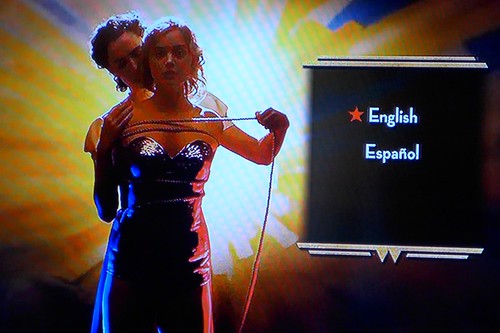History sometimes hands us a microcosm that reflects the macrocosm in a big way. The context is women's suffrage, and human rights more generally, in the face of longstanding religious and ritual practices.
Americans were seeing the rate of change of the rate of change on the increase, per future futurist Alvin Toffler's Future Shock. Comic books were a harbinger, leveraging low cost publishing with high dissemination rates, a forerunner of the World Wide Web. People were hungry for superheroes, and not all of them could be men. Wonder Woman to the rescue.
However, the story is more circuitous, in that privileged, educated, elite Americans needed to feel the brunt of the dominant majority's anxious ire, its defense of a brittle integrity, before a more literate and psychologically well-founded formula could be supplied. Female superheroes had been a flop hitherto.
Literature has always played on the edge, like HBO today. Who pays for a diet of pabulum? WW would need to be a tad risque. Only risk takers risk risqueness, weirdness, queerness. People queue for what's quirky and quixotic.
Dr. Marston was the guru, the brains, but not a genius at drawing. He could communicate what he wanted to see, down to the smallest detail of rope thickness, how tied. But he didn't work in a vacuum, as comes out during his inquisition, in the form of flashbacks. He's also the front man for a committee, they're a threesome. Or are these women his human subjects?
This inquisition into private lives was even before the Red Scare, which blamed civil rights activism on Russians "sowing discord" among right-thinking Americans. Prohibition was already in full swing. The film shows the state of unfreedom that went along with that amendment to the US Constitution, since repealed (although many languish in the prisons thanks to Cannabis Laws).
Marston was not accused of being Communist (McCarthy came later). He was "polyamorously perverse" (to play on Norman O. Brown) in ways that less disciplined more jealous individuals would be unable to coax into a long term molecular family, with kids, a house in the burbs, personal cars etc.. They were living the dream.
However, the nuclear model was about the only one permitted were sex to be involved, despite Biblical precedent.
And besides, wasn't allowing two wives to one man a sliding backwards in any case? Women were finally coming to own property, after centuries of being owned, as property.
The movie studies these questions, like an earnest student, as we follow this family as only an omniscient camera can, we come to be immersed and perhaps enamored of its charms. The bottom line is choice. Is compliance voluntary?
The "true story" doesn't need a lot of help, only framing. When the bullying intensifies, the molecular bonds bend and break under pressure. Chemistry happens, at every level.
After Dr. Marston died of cancer, his Wonder Woman superhero underwent a sanitizing facelift and became less controversial. But then her meme was readopted by the feminist movement, and now, with the recent Wonder Woman blockbuster out there, the whole story comes out, behind her genesis. The Smithsonian Institution helped with the research.
What's always been obvious is the dominant majority feels entitled to use "kinky" "commie" and "pinko" as relatively synonymous, along with "freak" and maybe "egghead". These are the lowlife people we have license to bully, to punish, sometimes only vicariously through horror films, wherein the transgressors face the consequences of depravity (much to the audience's cathartic pleasure).
[ Joss Whedon consciously set about to overturn the whole formula when the protagonists smoke dope, yet don't face extreme rendering, their just deserts, in CGI. ]
Marston enjoys a pretty good life and his creativity lives on. I'm guessing his story, and that of his wonder women, will filter into common knowledge at least among the comic book aficionados, our future leadership.
Molecular families of the future will have their own reasons to celebrate this superhero's genesis story.
I recommend viewing this in double or triple feature with both Kinsey and Manji. The former is about a sex researcher facing a lot of the same push-back as the Marstons did. Manji, possibly hard to find in your neck of the woods, is twisty-turny tale of Japanese trying to sort through their love triangles and finding it no easier in Japan.

